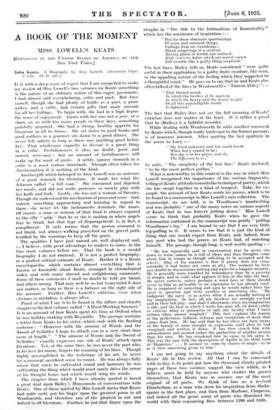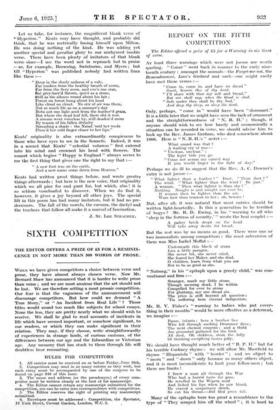A BOOK OF THE MOMENT
MISS LOWELL'S KEATS
(COPYRIGHT IN THE UNITED STATES OF AMERICA BY THE
New York Times.] IT is with a deep sense of regret that I am compelled to make my review of Miss Lowell's two volumes on Keats something al the nature of an obituary notice of this eager, passionate, had almost said overwhelming, critic and poet. But Amy Lowell, though she had plenty of faults as a poet, a prose writer, and a critic, had certain gifts that made amends for all her failings. To begin with, she had in a high degree the sense of enjoyment. GUsto with her was not a pose, or a sham, or, as With too many people in these days, something painfully acquired. ' She had a strong, healthy appetite for literature in all its forms. She sat down to good books and good authors as a gourmet sits doWn to a goOd. dinner. She never felt satiety as long as there was anything good before her. That wholesome capacity to devour is a great thing in a critic. Fastidiousness is also, no doubt, good, and indeed, necessary ; but no amount of fastidiousness will make up for want of gusto. A sickly, queasy stomach in a critic is a most serious drawback. Though often taken for 4liscrimination it is nothing of the kind.
Anothergift which belonged to Amy Lowell was an outcome of a good stomach for literature. It made her what Dr. Johnson called a full man." She consumed and digested her meals, and did not make pretence, or merely play with her knife and fork. Lastly, she was not a woman of theories. Though she understood the mechanism of prose and verse—had, indeed, something approaching real learning in regard to them—she never let the instruments dominate the tunes. Of course, a man or woman of that kind is always exposed to the silly " quip " that he or she is rushing in where angels fear to tread, but that type of disparagement is, in fact, a compliment. It only means that the person censured is not timid, not always walking pussyfoot on the gravel path, terrified by the warnings to keep off the grass.
The qualities I have just named are well displayed and, Es I believe, with great advantage to readers to come, in the two stout volumes before me. That the book is a model biography I do not contend. It is not a perfect biography, or a perfect critical estimate of Keats. Rather it is a Keats encyclopaedia, which contains almost everything that is known or knowable about Keats, arranged in chronological order, and with many shrewd and enlightening. comments. Some of these comments I shall no doubt be told are banal, and others wrong. That may well be so, but tomy mind it does not matter, as long as there is a balance on the right side of the account. Further, Miss Lowell's criticism, even when obvious or mistaken, is always alive.
Proof of what I say is to be found in the diffuse and chaotic chapter in the first volume, called " A Hard-Working Summer." It is an account of how Keats spent his time at Oxford when he was holiday-making with Reynolds. The passage contains a letter from Keats to. his sister, which ends with the flashing sentence : " However with the armour of Words and the Sword of Syllables I hope to attack you in a very short time more at length." " The armour of Words and the Sword of Syllables " exactly expresses one side of Keats' attack upon literature. Yet, at the same time, he was never the poet who, In his love for music, forgets the meaning of his lines. Though highly accomplished in the technique of his art, he never for a moment sacrificed sense to sound. He was always fully aware that when he cultiVated sound and harmony he was cultivating the thing which would most surely drive the arrow of his thought home and which would wing his words.
The chapter from which I have already quoted is based a great deal upon Bailey's Memoranda of conversations with
Keats. One of those quoted by Miss Lowell shows that Keats had quite early put his finger upon the greatest poem in all Wordsworth, and therefore one of the greatest in our and indeed in all literature: Further. 'he put that -finger upon the strophe in "The Ode to the Intimations of Immortality" which has the maximum of inspiration :— " But for these obstinate questionings
Of sense and outward things, Fallings from us, vanishings ; Blank misgivings of a creature Moving about in worlds not realized, High instincts, before which our mortal nature Did tremble like a guilty thing surprised."
The last lines, Bailey tells us, Keats considered " were quite awful in their application to a guilty finite creature, like man, in the appalling nature of the feeling which they suggested to a thoughtful mind." He goes on to say that he and Keats also often talked of the lines in Wordsworth 's " Tintern Abbey" :- " That blessed mood, In which the burthen of the mystery. In which the heavy and the weary weight
Of all this unintelligible world • is lightened."
The fact that Bailey does not see the full meaning of Keats' criticism does not matter in *the least. It is 'rather a proof that he (Bailey) is a faithful recorder.
While dealing with Wordsworth he adds another comment by Keats which, though really irrelevant to the former passage. is of immense interest. After quoting the last quatrain in the poem to Lucy :-
" She lived unknown and few could know When Lucy ceased to be ;
But she is in her grave, and oh,
The difference to me,"
he adds, " The simplicity of the last line," Keats declared, " to be the most perfect pathos."
What is noteworthy in this context is the way in which Miss Lowell recognized the importance of the various fragments, telling of Keats' attitude towards the technique of poetry, which she has swept together in a kind of tempest. Take, for ex- ample, the account of how Keats wrote his poems, which is to be found in a manuscript in Miss Lowell's own collection. The manuscript, we are told, is in Woodhouse's handwriting' and was probably " one of the many notes on various aspects of Keats that lie was forever jotting down." Miss Lowell seems to think that probably Keats when he gave the information contained in the manuscript was gently " pulling Woodhouse's leg." I am bound to say that I see very little leg-pulling in it. It seems to me that it is just the kind of thing that one would expect from Keats, and, indeed, from any poet who had the power, as Keats had, of watching himself. The passage, though long, is well worth quoting :— " He has repeatedly said in conversation that he never sits down to write, unless he is full of ideas, and then thoughts come about him in troops as though soliciting to be accepted and ho selects. (One of his maxims is that if poetry does not come naturally it had better not come at all.) The moment he feels any dearth he discontinues writing and waits for a happier moment. He is generally more troubled by redundancy than by a poverty of images, and he culls what appears to him at the time the best. He never corrects, unless perhaps a word here or there should occur to him as preferable to an expression he has already used. He is impatient of correcting and says he would rather burn the piece in question and write another *or Something else. My judgment' (he says) ' is as active while I am actually writing as my imagination. In fact, all my faculties are strongly excited and in their full play—and shall I afterwards, when my imagination is idle, and the heat in which I wrote has gone off, sit down coldly to criticize when in possession of only one faculty What I have written when almost inspired ? ' This fact explains the reason of the perfectness, fullness, richness and completion- of most that comes from him. He has said that he has .often not. been aware of, the beauty of some thought or expression until after lie had composed and written it down: It has then struck hind with astonialurient and seemed rather -the production of another person than his own. He has wondered how he came to hit upon it. This was the case with the description of Apollo in his third book of 'Hyperion.' . . . It seemed to come by chance or magic—to be as it were something given to him."
I am not going to say anything about the details of Keats' life in this review. All that I can be concerned with to-day is to point out how the thousand closely printed pages of these two volumes support the view which, as I believe, must be held by anyone who studies the poems themselves, that Keats was in essence one of the most original of all poets. We think of him as a revived Elizabethan, as a man who drew his inspiration from Shake-
speare in the first place, and then of Marlowe, Chapman,
and indeed all the great array of poets who illumined the world with their consuming fires between 1590 and 1620. Let us take, for instance, the magnificent blank verse of "Hyperion." Keats may have thought, and probably did think, that he was metrically basing himself upon Milton. He was doing nothing of the kind. He was adding yet another special and peculiar glory to our unrhymed iambic verse. There have been plenty of imitators of that blank verse since—I use the word not in reproach but in praise .—as, for example, Browning, Swinbume, and Myers ; but till "Hyperion" was published nobody had written lines like these :— • " Deep in the shady sadness of a vale,
Far sunken from the healthy breath of morn, Far from the fiery noon, and eve's one star, at grey-hair'd Saturn, quiet as a stone, Still as the silence round about his lair ; Forest on forest hung about his head Like cloud on cloud. No stir of air was there, Not so much life as on a summer's day
Robs not one light seed from the feather'd grass.
But where the dead leaf fell, there did it rest.
A stream went voiceless by, still deaden'd more By reason of his fallen divinity Spreading a shade : the Naiad 'mid her reeds Press'd her cold finger closer to her lips."
Keats' originality is also extraordinarily conspicuous to those who have eyes to see in the Sonnets. Indeed, it was in a sonnet that Keats' " celestial votaress " first entered into his mind and crowned his head with flowers. The sonnet which begins " Happy is England " always seems to me the first thing that gives one the right to say that :— " A new foot was on the earth,
And a new name come down from Heaven."
Keats had written great things before, and wrote greater things afterwards ; but here is the new voice, that originality which we all pine for and pant for, but which, alas ! it is so seldom vouchsafed to discover. When we do find it, however, it gives a joy beyond all other joys. The special lilt in this poem has had many imitators, but it had no pre- decessors. The fall of the vowels, the caesura, the dactyl and the trochees that follow all make it a marvel of fascination.
J. ST. LOE STRACHEY.















































 Previous page
Previous page